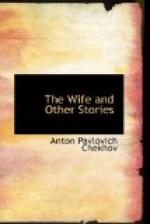My Excellency is conducted into the street, and seated in a cab. As I go along, having nothing to do, I read the signboards from right to left. The word “Traktir” reads “Ritkart”; that would just suit some baron’s family: Baroness Ritkart. Farther on I drive through fields, by the graveyard, which makes absolutely no impression on me, though I shall soon lie in it; then I drive by forests and again by fields. There is nothing of interest. After two hours of driving, my Excellency is conducted into the lower storey of a summer villa and installed in a small, very cheerful little room with light blue hangings.
At night there is sleeplessness as before, but in the morning I do not put a good face upon it and listen to my wife, but lie in bed. I do not sleep, but lie in the drowsy, half-conscious condition in which you know you are not asleep, but dreaming. At midday I get up and from habit sit down at my table, but I do not work now; I amuse myself with French books in yellow covers, sent me by Katya. Of course, it would be more patriotic to read Russian authors, but I must confess I cherish no particular liking for them. With the exception of two or three of the older writers, all our literature of today strikes me as not being literature, but a special sort of home industry, which exists simply in order to be encouraged, though people do not readily make use of its products. The very best of these home products cannot be called remarkable and cannot be sincerely praised without qualification. I must say the same of all the literary novelties I have read during the last ten or fifteen years; not one of them is remarkable, and not one of them can be praised without a “but.” Cleverness, a good tone, but no talent; talent, a good tone, but no cleverness; or talent, cleverness, but not a good tone.
I don’t say the French books have talent, cleverness, and a good tone. They don’t satisfy me, either. But they are not so tedious as the Russian, and it is not unusual to find in them the chief element of artistic creation—the feeling of personal freedom which is lacking in the Russian authors. I don’t remember one new book in which the author does not try from the first page to entangle himself in all sorts of conditions and contracts with his conscience. One is afraid to speak of the naked body; another ties himself up hand and foot in psychological analysis; a third must have a “warm attitude to man”; a fourth purposely scrawls whole descriptions of nature that he may not be suspected of writing with a purpose.... One is bent upon being middle-class in his work, another must be a nobleman, and so on. There is intentionalness, circumspection, and self-will, but they have neither the independence nor the manliness to write as they like, and therefore there is no creativeness.
All this applies to what is called belles-lettres.




